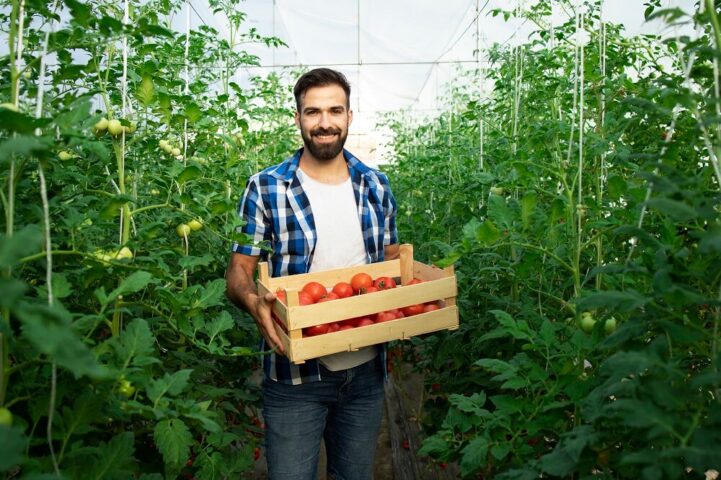The European temporary labour market has been painfully affected by the coronavirus pandemic with most seasonal workers from the Czech Republic, Slovakia, Poland, Bulgaria, or Romania returning to their home countries during the lockdown. Employers in countries such as Germany, France, and the Netherlands had considerable trouble finding workforce during that period. There was particular tension in the agricultural and horticultural sectors. After all, harvesting fruit or vegetables cannot be postponed. How is it now? Does seasonal work abroad pay off? How much can you earn in the Netherlands?
Working abroad in the fruit and vegetable harvest
The Netherlands is one of the world’s largest exporters of fruit and vegetables. The harvest season starts in the Netherlands around mid-May and lasts until the end of September. The demand for seasonal workers in the agricultural sector increases especially during the summer (June/July). However, greenhouse work can be found here all year round. After all, the country is famous for growing tomatoes, peppers, cucumbers, and strawberries under glass. Greenhouse production of raspberries and blackberries is also increasing year on year.
Dutch employers are looking for workers for both the removal of old plants and the planting and maintenance of new crops. Some of the commonest activities performed in greenhouses are leaf cutting, as well as pollination of vegetables, and castration (removal of stamens) of their flowers. During the harvest, seasonal workers are also needed to clean, sort, and then pack vegetables and fruit.
As far as outdoor work goes, temporary workers are particularly needed in the summer to look after field crops of asparagus, lettuce and cabbage, cauliflower, marrow, and leek, as well as in fruit orchards (apples, pears, plums). There is no shortage of offers in the harvest time at sorting plants and production halls.
The main requirement to get a job in harvesting is physical fitness and, for some positions, basic English language skills. A large group of seasonal workers in fruit and vegetable harvesting is students of secondary schools and universities looking for summer jobs. Over 2-3 months of their working abroad, young people can set aside enough money for their tuition fees or room rent during the academic year.
Seasonal work in horticulture
The Netherlands is famous for growing many species of flowers, including, of course, tulips. The best time to start a job in gardening is late spring and early summer, but you will find offers for greenhouse work all year round. The duties of a flower plantation worker include caring for the seedlings, as well as harvesting, sorting, labelling, and preparing the flowers for shipment. The most common species of greenhouse flowers are orchids, roses, lilies, and anthuriums.
From May to September, you can find outdoor jobs involving field crops of flowers such as tulips, hyacinths, lilies, and peonies. On the other hand, from November to January, Dutch growers look for a large number of people to sort flower bulbs and ensure their quality control. Interestingly, the Netherlands produces more than 2 million tulip bulbs annually, of which it exports as many as 90 per cent. From September, employment will also be found in Christmas tree growing.
In addition to physical fitness, manual skills are the main requirement for those keen to find a job on a flower plantation. For this reason, some producers recruit exclusively women for work with flowers. Also, English is required for some positions at sorting plants and facilities.
Seasonal work in manufacturing
It is worth knowing that not only is the Netherlands a country of flower, vegetable, and fruit growers, but a hotbed of food companies. Throughout the year, you will easily find a job in production – involving food products such as eggs, salads, bread, fries, and meat. What’s more, employees are also sought for the production of floral decorations (Christmas-themed) from September to December.
You don’t need considerable qualifications to work on a production line in the Netherlands. Although even a basic knowledge of English isn’t required for most positions, it will certainly work to the employee’s advantage.
How much can you earn doing seasonal work abroad?
The salary of a seasonal worker cannot be lower than the statutory minimum wage in the Netherlands. As of July 1, 2022, a minimum of 1,756.20 EUR per month gross is due to a temporary worker aged over 21 for a 40-hour week, which amounts to 405.30 EUR per week and 81.06 EUR per day.
Gross minimum hourly wages in the Netherlands in selected industries:
- work in a supermarket – 10,14€
- work in catering – 10,67€
- work in the hotel industry – 10,67€
- work in a greenhouse – 10,67€.
How to find seasonal work abroad?
When browsing through adverts on job seekers’ websites, you may come across seasonal job offers abroad available immediately. However, before rashly deciding to leave for the Netherlands, it’s advisable to check carefully beforehand whether a particular job offer isn’t a fraudulent attempt. This is particularly important if you only want to be employed for a few weeks, for example during the summer holiday.
In Poland, for instance, the best way to avoid unpleasant surprises is to screen the employer or recruitment agency in question with the National Court Register (KRS), or to check its certification with the National Register of Employment Agencies (KRAZ).
The reliability and integrity of the temporary agency will also be guaranteed by its membership in the ABU or its presence in the NBBU register.
At https://www.abu.nl/over-abu/ledenregister/ you can check this by entering the name of the agency you’re researching, while www.nbbu.nl/onze-leden/ provides a full list of affiliated agencies.
Intermediary agencies that don’t belong to one of these organisations may take advantage of employees’ ignorance and fail to comply with the provisions of CAO in the Netherlands. We recommend looking for seasonal work abroad at affiliated agencies such as Carrière. This way, you’ll be sure that your rights won’t be violated.

















